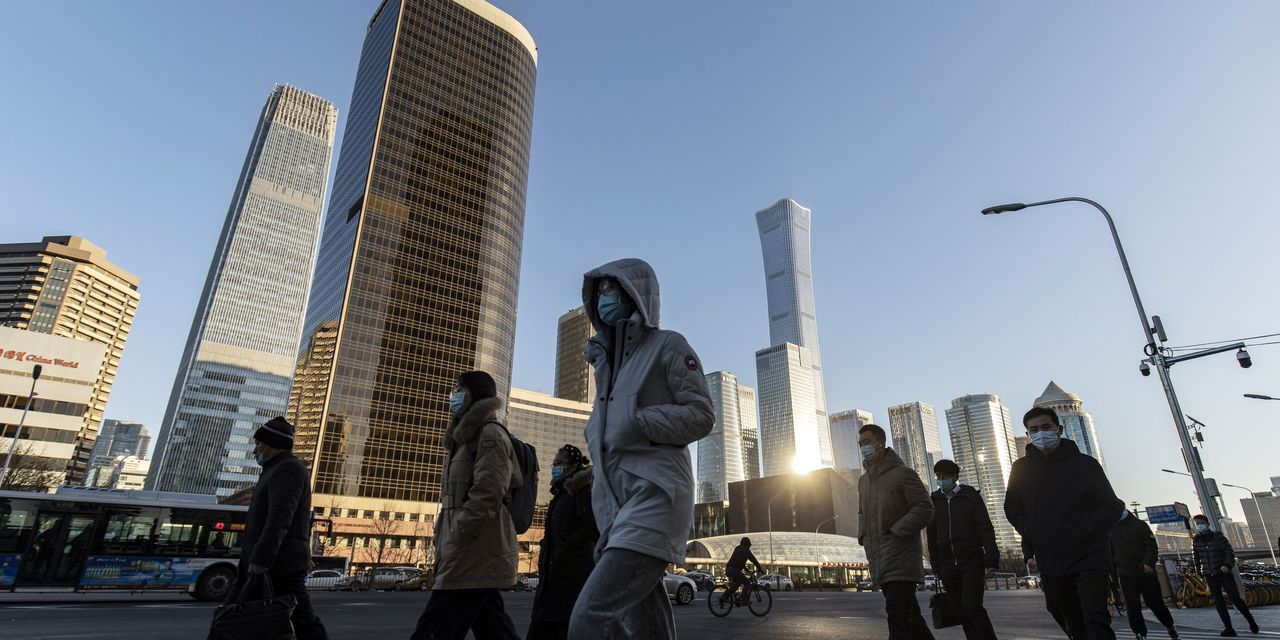

The extra yield that Chinese government bonds offer over U.S. Treasurys this week dropped below a percentage point for the first time in nearly three years, as the central banks of the world’s two largest economies move in opposite directions.
The narrowing gap, reflecting both a rally in Chinese bonds and a U.S. selloff, reduces one longstanding argument in favor of foreign investors buying more Chinese debt. But analysts and investors say the long-term torrent of international money pouring into Chinese fixed-income markets is likely to continue.
Chinese sovereign bonds have gained in price as Beijing eases policy to support a slowing economy. That has pushed down yields, which move inversely to prices, with the yield on the benchmark yuan-denominated 10-year bond dropping to 2.72%.
At the same time, investors are bracing for a string of interest-rate increases from the Federal Reserve to combat rapid inflation. That has helped lift the yield on the 10-year Treasury note, which stood at about 1.79% on Friday afternoon Hong Kong time.
U.S. inflation, as measured by the consumer-price index, hit an annual rate of 7% in December, the highest level in nearly four decades. For the same month, China’s CPI rose 1.5%.
“In China, growth is slowing; inflation is low; policy makers are easing. In the U.S., you have the economy growing, inflation running well above target, and the Fed getting on with normalizing monetary policies,” said Ashish Agrawal, the Asia head of foreign-exchange and emerging markets macro strategy research at Barclays.
“For a bond investor, China bonds are a much safer proposition than U.S. fixed income,” he said.
In addition, most foreign buyers are central banks, sovereign-wealth funds and large China-dedicated funds and are unlikely to be deterred by a shrinking yield spread, Mr. Agrawal said.
This week, the People’s Bank of China cut some key rates, including the one- and five-year loan prime rates, and said it would act early and forcefully to help stabilize the economy this year.
China has moved into “outright easing” mode—and has become the only major bond market where yields have dropped so far this year, said Andre de Silva, head of global emerging markets rates research at HSBC.
Analysts and investors expect the yield gap—which was last below 1% in May 2019—to shrink more in the coming months, as China eases policy further and the U.S. scrambles to fight inflation.
A key draw for many bondholders is the diversification offered by Chinese debt, which typically doesn’t move in tandem with American or global equivalents. Some investors say it is also important to look at the real, or inflation-adjusted, interest rates on offer in different markets, rather than focusing solely on nominal yields, which don’t take into account how rising prices erode purchasing power.
Chinese bonds still offer a positive real yield, said Brad Gibson, co-head of Asia-Pacific fixed income at AllianceBernstein. “The same cannot be said for the U.S. Treasury,” he said. The yield on 10-year U.S. inflation-protected securities stood at negative 0.5% as of Thursday, Refinitiv data showed.
Foreign holdings of Chinese government debt rose to a record 2.5 trillion yuan, the equivalent of about $394 billion, in December, according to the China Central Depository & Clearing Co. Ownership has risen steadily in recent years as Beijing has made it easier to invest in the market and index providers have added Chinese debt to their gauges.
Robust demand for Chinese bonds and stocks—and surging exports—have helped support the yuan, even though easier monetary policy would typically lead to a weaker currency. The yuan was trading at about 6.35 to the dollar in offshore markets on Friday.
Flows into Chinese government bonds have picked up in recent weeks as investors have sought shelter from the Treasury-market selloff, said Becky Liu, head of China macro strategy at Standard Chartered Bank. Investors are typically bearish on bonds when global central banks are tightening, she said.
“Therefore, for those who cannot really reallocate from fixed income into something else, Chinese government bonds become a safe haven because the People’s Bank of China is the only dovish central bank this year,” Ms. Liu said.
Write to Rebecca Feng at rebecca.feng@wsj.com
Copyright ©2022 Dow Jones & Company, Inc. All Rights Reserved. 87990cbe856818d5eddac44c7b1cdeb8
24World Media does not take any responsibility of the information you see on this page. The content this page contains is from independent third-party content provider. If you have any concerns regarding the content, please free to write us here: contact@24worldmedia.com

Common Mistakes When Using Athletic Field Tarps

High-Performance Diesel Truck Upgrades You Should Consider

Warehouse Optimization Tips To Improve Performance

Fire Hazards in Daily Life: The Most Common Ignition Sources

Yellowstone’s Wolves: A Debate Over Their Role in the Park’s Ecosystem

Earth Day 2024: A Look at 3 Places Adapting Quickly to Fight Climate Change

Millions of Girls in Africa Will Miss HPV Shots After Merck Production Problem

This Lava Tube in Saudi Arabia Has Been a Human Refuge for 7,000 Years

Four Wild Ways to Save the Koala (That Just Might Work)

National Academy Asks Court to Strip Sackler Name From Endowment

Ways Industrial Copper Helps Energy Production

The Ins and Out of Industrial Conveyor Belts